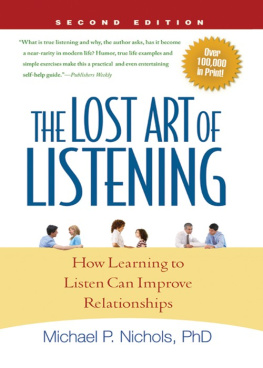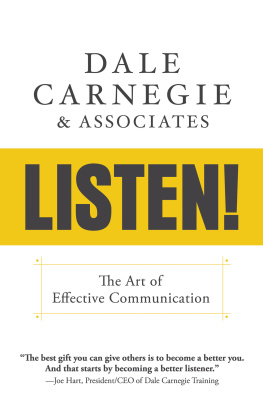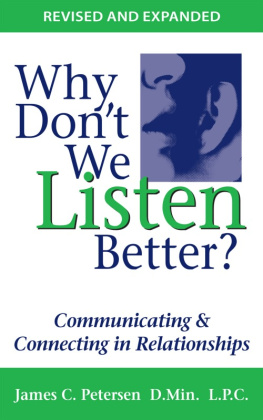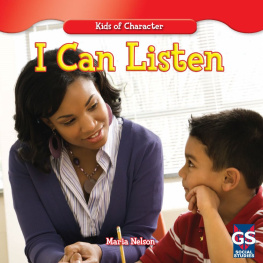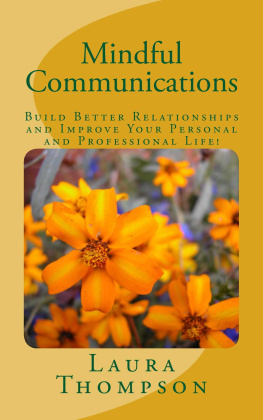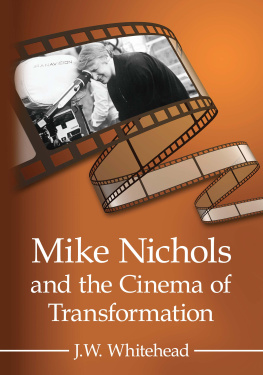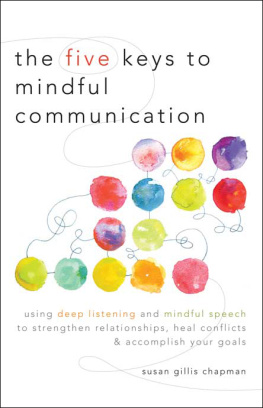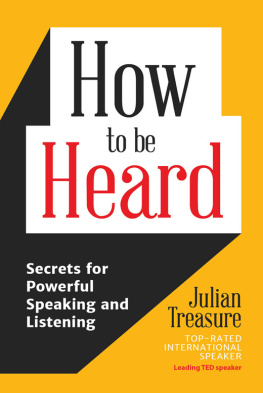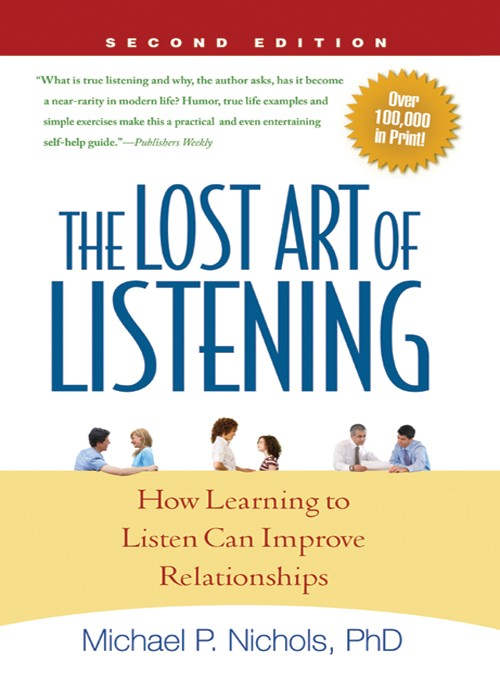The Lost Art
of Listening
How Learning to Listen
Can Improve Relationships
SECOND EDITION
Michael P. Nichols

T HE G UILFORD P RESS
New YorkLondon
2009 Michael P. Nichols
Published by The Guilford Press
A Division of Guilford Publications, Inc.
72 Spring Street, New York, NY 10012
www.guilford.com
All rights reserved
2009 Epub Edition ISBN: 9781606237366
The information in this volume is not intended as a substitute for consultation with healthcare professionals. Each individuals health concerns should be evaluated by a qualified professional.
No part of this book may be reproduced, translated, stored in a retrieval system, or transmitted, in any form or by any means, electronic, mechanical, photocopying, microfilming, recording, or otherwise, without written permission from the Publisher.
Last digit is print number: 9 8 7 6 5 4 3 2 1
Library of Congress Cataloging-in-Publication Data
Nichols, Michael P.
The lost art of listening : how learning to listen can improve relationships / Michael P. Nichols. 2nd. ed.
p. cm.
Includes index.
ISBN 978-1-60623-064-0 (hardcover : alk. paper)
ISBN 978-1-59385-986-2 (pbk. : alk. paper)
1. Listening. 2. Interpersonal relations. 3. Interpersonal communication. I. Title.
BF323.L5N53 2009
153.68dc22
2008054617
Contents
Part One
The Yearning to Be Understood
1 Did You Hear What I Said?:
Why Listening Is So Important
2 Thanks for Listening:
How Listening Shapes Us and Connects Us to Each Other
3 Why Dont People Listen?:
How Communication Breaks Down
Part Two
The Real Reasons People Dont Listen
4 When Is It My Turn?The Heart of Listening:
The Struggle to Suspend Our Own Needs
5 You Hear Only What You Want to Hear:
How Hidden Assumptions Prejudice Listening
6 Why Do You Always Overreact?!:
How Emotionality Makes Us Defensive
Part Three
Getting Through to Each Other
7 Take Your TimeIm Listening:
How to Let Go of Your Own Needs and Listen
8 I Never Knew You Felt That Way:
Empathy Begins with Openness
9 I Can See This Is Really Upsetting You:
How to Defuse Emotional Reactivity
Part Four
Listening in Context
10 We Never Talk Anymore:
Listening Between Intimate Partners
11 Nobody around Here Ever Listens to Me!:
How to Listen and Be Heard within the Family
12 From Do I Have To? to Thats Not Fair!:
Listening to Children and Teenagers
13 I Knew Youd Understand:
Being Able to Hear Friends and Colleagues
Nothing hurts more than the sense that the people we care about arent really listening. We never outgrow the need to have our feelings known. Thats why a sympathetic ear is such a powerful force in human relationshipsand why the failure to be understood is so painful.
My ideas about listening have been sharpened by thirty-five years as a psychoanalyst and family therapist. Refereeing arguments between intimate partners, coaching parents to communicate with their children, and struggling myself to sustain empathy as my patients faced their demons has led me to the conclusion that much of the conflict in our lives can be explained by one simple fact: people dont really listen to each other.
Talking without listening is like snipping an electrical cord in half and hoping that somehow something will light up. Most of the time, of course, we dont deliberately set out to break the connection. In fact, were often baffled and dismayed by feeling left in the dark.
Modern culture has developed conceptions of individualism that picture us finding our own bearings within, declaring independence from the webs of interlocution that formed us. Its as though when we become finished persons we outgrow our need for attention, like training wheels. All this is not to say that we cant be autonomous, in the sense of being self-directing, even original, able to think and act on our own. But we cannot escape the human condition and become secure and satisfied without conversationconversation in a broad sense, meaning some kind of interchange with others.
Contemporary pressures have, regrettably, shrunk our attention spans and impoverished the quality of listening in our lives. We live in hurried times, when dinner is something you zap in the microwave and keeping up with the latest books and movies means reading the reviews. Thats all weve got time for. Running to and from our many obligations, we get a lot of practice in not listening. When were in the car and the radio is on, sometimes its interesting and we pay attention, other times we have to concentrate on the road or we get sidetracked with a thought, and minutes go by without our hearing a word of what was said. When were watching TV and the commercials come on, half the time we dont hear a thing.
Were bombarded with so many imagesfrom television, e-mail, junk mail, the Internet, cell phones, BlackBerrys, iPods, pagers, faxesthat our attention is fractionated. We like to think were good at multitasking. We check our e-mail while talking on the phone. We look for things to buy in catalogues while watching TV. We fool ourselves into thinking that we can do more than one thing at a time. The truth is that we just end up doing one thing after another poorly.
Weve gained unparalleled access to information and lost something very important. Weve lost the habit of concentrating our attention. From pop music at the gym to commercials on TV and radio, were bombarded with so much noise that weve become experts at tuning things out. If a television show doesnt grab our attention in the first two minutes, we change the channel; if were listening to someone who doesnt get right to something were interested in, we tune out.
In the limited time we still preserve for family and friends, conversation is often preempted by soothing and passive distractions. Too tired to talk and listen, we settle instead for the lulling charms of electronic devices that project pictures, make music, or bleep across display screens. Is it this way of life thats made us forget how to listen? Perhaps. But maybe the modern approach to life is the effect rather than the cause of the decline of meaningful discourse. Maybe we lead this kind of life because were seeking some sort of solace, something to counteract the dimming of the spirit we feel when no one is listening.
How we lost the art of listening is certainly a matter for debate. What isnt debatable is that the loss leaves us with an ever-widening hole in our lives. It might take the form of a vague sense of discontent, sadness, or deprivation. We miss the consolation of lending an attentive ear and of receiving the same in return, but we dont know whats wrong or how to fix it. Over time this lack of listening impoverishes our most important relationships. We hurt each other unnecessarily by failing to acknowledge what the other one has to say. Whatever the arena, our hearts experience the failure to be heard as an absence of concern.
Conflict doesnt necessarily disappear when we acknowledge each others point of view, but its almost certain to get worse if we dont. So why dont we take time to hear each other? Because the simple art of listening isnt so simple.

